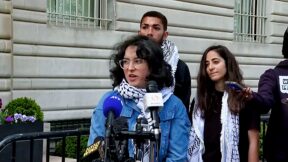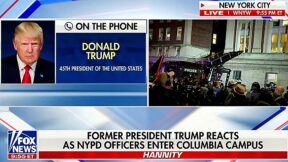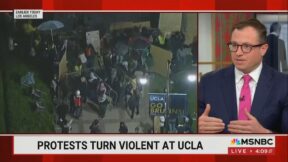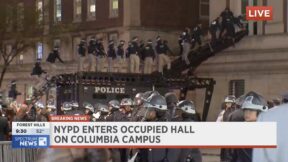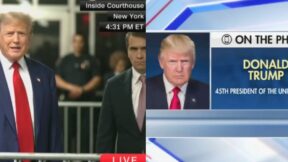U.S. Issue Assurances In Wikileaks Founder Julian Assange’s Extradition Case

Stella Assange, wife of Julian Assange, speaks besides a poster of Julian Assange at the Royal Courts of Justice in London, Wednesday, Feb. 21, 2024. Julian Assange’s lawyers are on their final U.K. legal challenge to stop the WikiLeaks founder from being sent to the United States to face spying charges. The 52-year-old has been fighting extradition for more than a decade, including seven years in self-exile in the Ecuadorian Embassy in London and the last five years in a high-security prison. (AP Photo/Kin Cheung)
The United States provided assurances to the British Foreign Office on Tuesday that it will not seek the death penalty against WikiLeaks founder Julian Assange nor block his potential to “raise” First Amendment defences.
The assurances were provided at the eleventh hour on deadline day as part of the ongoing extradition proceedings that could see Assange sent to the U.S. to face multiple charges under the 1917 Espionage Act.
Assange faces severe charges under U.S. law, including 17 counts of espionage, related to the publication of classified materials leaked by whistleblower Chelsea Manning that exposed US military actions in Iraq and Afghanistan. The U.S. claims that Assange encouraged and helped Manning obtain illegal materials, in part by offering to help her guess a password. Manning’s sentence was commuted by former President Barack Obama at the end of his term in office.
London High Court judges found a necessary condition to satisfy British extradition law, underpinned by the European Convention on Human Rights, required U.S. assurance that, if extradited and tried in the States, Assange would not face the death penalty and can rely on First Amendment protections.
The ruling said that to the US must agree that Assange can “rely on the First Amendment to the United States Constitution (which protects free speech), that he is not prejudiced at trial (including sentence) by reason of his nationality, that he is afforded the same First Amendment protections as a United States citizen and that the death penalty is not imposed.”
The note’s limited scope, however, does not appear to guarantee that Assange would enjoy First Amendment protections. According to the diplomatic note shared on Tuesday, Assange will be permitted to “raise and seek to reply upon at trial…the rights and protections given under the First Amendment.”
In criticism, Stella Assange, Assange’s wife, slammed the assurances as essentially meaningless.
“It makes no undertaking to withdraw the prosecution’s previous assertion that Julian has no First Amendment rights because he is not a U.S. citizen. Instead the U.S. has limited itself to blatant weasel words claiming that Julian can ‘seek to raise’ the First Amendment if extradited,” she tweeted.
This situation leaves Assange’s ability to defend himself using the First Amendment uncertain and subject to the whims of the US judiciary rather than offer concrete legal assurances. The High Court is scheduled to hold a hearing on May 20 to decide whether these U.S. assurances are credible and sufficient.
If the assurances are accepted, Assange faces immediate extradition.
In her statement Stella Assange said: “The diplomatic note does nothing to relieve our family’s extreme distress about his future – his grim expectation of spending the rest of his life in isolation in U.S. prison for publishing award-winning journalism. The Biden Administration must drop this dangerous prosecution before it is too late.”
A day ahead of the fifth anniversary of Assange’s detention in April, President Joe Biden said that the US is “considering” ending the prolonged prosecution of Assange.
Have a tip we should know? tips@mediaite.com
